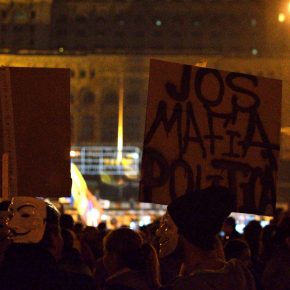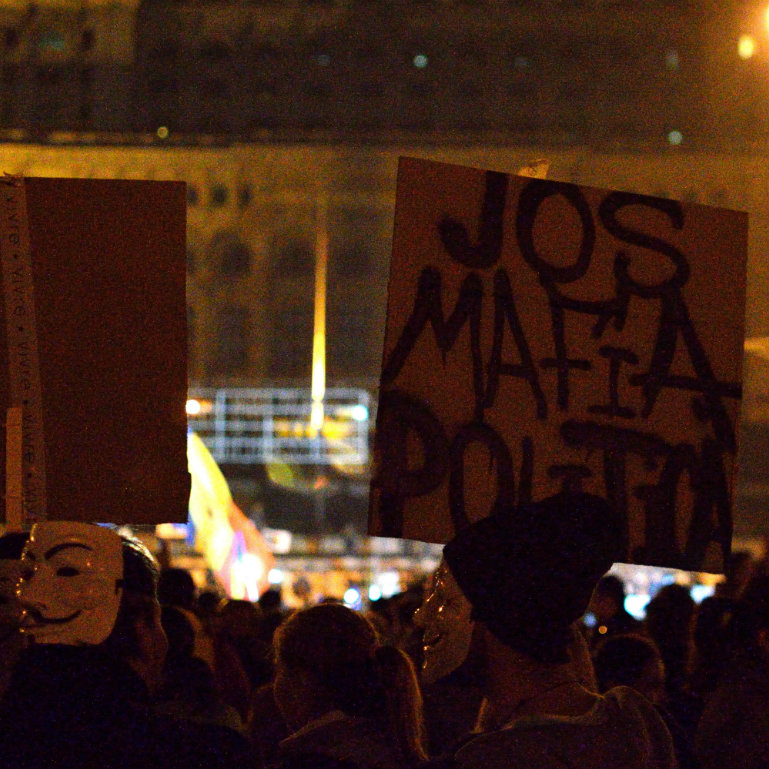
Anti-corruption protests in Bucharest, Romania (Jake Stimpson, CC BY)
Accidents happen throughout the world, so why did over 20,000 demonstrators demanding the prime minister’s resignation on November 3rd outside the seat of the government shout that Ponta is a criminal and has blood on his hands? It wasn’t only an outpouring of anger over the tragic death of young people in a Bucharest club, but rather an expression of frustration and disillusionment in the weak and corrupt state. None of the demonstrators was in any doubt that the owners of the club in which the fire broke out had permission to hold an indoor fireworks display only because they had paid a bribe.
The Prime Minister of Romania, Victor Ponta, resigned on November 4th. The direct reason for his decision was the fire in which more than 30 people were killed. However, it is a scandal, and not this accident, which caused the mass street protests. The new Prime Minister Dacian Cioloș formed his government which is a mixture of experts, diplomats and civil society activists.
Although Romania has done much to fight corruption in recent years, much still remains to be done. The creation of an institution to tackle bribery, the National Anti-corruption Directorate, was recognised by the European Commission as one of the most effective bodies in Europe dealing with fighting this type of crime. Among others, the fact that it has the courage to also deal with accusations regarding leading politicians is testimony to the effectiveness of the institution. The procedures are good, but they are not able to cope with the tremendous scale of the problem. In the European Commission’s annual anti-corruption report, Romania ranks very low. http://ec.europa.eu/dgs/home-affairs/what-we-do/policies/organized-crime-and-human-trafficking/corruption/anti-corruption-report/docs/2014_acr_romania_factsheet_en.pdf
Public contracts and health care are riddled with corruption. According to data from corruption monitoring bodies, 60 per cent of respondents have offered a doctor an envelope with money at least once in their life, and for 59 per cent of respondents a bribe seemed to be the best guarantee that an operation will be performed correctly.
When in office, Victor Ponta presented a novel way of fighting corruption in the health care: he proposed to legalise giving gifts to doctors, provided that the patients then revealed the gifts in their tax statements. According to the former prime minister the implementation of such solutions would resolve two major problems with the health care: it would eliminate the uncontrolled flow of money between doctors and patients and it would increase the earnings of medical personnel and thus hospital staff would not have to look for better employment conditions abroad.
However, corruption reaches much higher. In September the mayor of Bucharest, Sorin Oprescu, was arrested on charges of accepting bribes from companies which the city had awarded public contracts, while in February, Elena Udrea, then the minister of tourism and a presidential candidate, was forced to abandon her dreams of a political career due to corruption charges.
Ponta’s resignation after the tragic fire should not be interpreted only in categories of political responsibility for inadequate supervision of a subordinate institution. Corruption charges were also made against him, and besides this he was accused of forging documents, money laundering and tax fraud, not to mention the accusation of plagiarism regarding his doctorate. As early as the summer, investigators announced that they had sufficient evidence to shortly make formal charges against the former head of the government.
Although corruption is still a serious problem the country is developing economically. Unemployment is below 7 per cent, while GDP was almost the fastest growing in Europe in the second quarter of 2015, reaching 3.7 per cent. In the face of pressure from the International Monetary Fund and the European Commission, Bucharest is continually implementing economic reforms which are aimed at encouraging foreign capital to invest – privatization is progressing, previously identified barriers holding back the development of capital markets are being removed, and taxes and labour costs are being lowered.
Unfortunately the implementation of these ideas is rather lame. Unemployment is low as new jobs are being created because foreign firms are transferring their production plants to Romania due to very low labour costs. The average gross wage in May 2015 was the equivalent of PLN2,342, while the minimum wage was PLN894. The only country in the EU where it is lower is Bulgaria. Romania has observed an intensive outflow of specialists, who can earn even over a dozen times more abroad.
In particular, doctors are keen to leave – while there were 21,400 doctors employed in Romanian hospitals in 2011, in 2014 only 14,400 worked in state hospitals. A doctor at the start of a career can expect to earn EUR350 per month (this amount was recently increased – earlier junior doctors working in state hospitals were paid EUR200). The missing 7,000 doctors can be found in German and French hospitals, where even a doctor at the start of a career can have a salary several times higher.
Some of the government’s ideas to kick-start the economy are controversial. In August, in defiance of the IMF and the European Commission, the government decided to reduce the basic rate of VAT from 24 per cent to 20 per cent with effect from 1 January 2016 and further to 19 per cent with effect from 2017. In turn, in June the reduced VAT rate on food came into force (from 24 per cent to 9 per cent). The aim of these actions is to stimulate economic growth (and in the short-term it worked – in June retail sales growth in Romania reached almost 8 per cent in annual terms), but experts warn that this will lead to an increase in the deficit, which is why it is raising concerns in international organisations and the central bank.
What conclusions should the new PM draw from this situation? Firstly, he cannot allow a slowdown of the process of cleansing all levels of administration of people who accept bribes. Even if there are accusations against politicians in the closest circles of power, the prime minister must give the officials of the Anti-corruption Directorate full room for manoeuvre, regardless of the political costs that he himself incurs. Secondly, the government cannot let the good economic situation go to its head and try to live off the dividends of today’s economic growth. Economic growth of 3.7 per cent is an enviable achievement, but in order not to undermine it, the state must refrain from unnecessary interventionism and allow the market to work.

